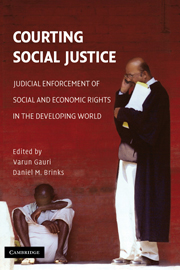Book contents
- Frontmatter
- Contents
- Foreword
- Preface
- Contributors
- 1 Introduction: The Elements of Legalization and the Triangular Shape of Social and Economic Rights
- 2 Litigating for Social Justice in Post-Apartheid South Africa: A Focus on Health and Education
- 3 Accountability for Social and Economic Rights in Brazil
- 4 Courts and Socioeconomic Rights in India
- 5 The Impact of Economic and Social Rights in Nigeria: An Assessment of the Legal Framework for Implementing Education and Health as Human Rights
- 6 The Implementation of the Rights to Health Care and Education in Indonesia
- 7 Transforming Legal Theory in the Light of Practice: The Judicial Application of Social and Economic Rights to Private Orderings
- 8 A New Policy Landscape: Legalizing Social and Economic Rights in the Developing World
- Index
- References
2 - Litigating for Social Justice in Post-Apartheid South Africa: A Focus on Health and Education
Published online by Cambridge University Press: 27 July 2009
- Frontmatter
- Contents
- Foreword
- Preface
- Contributors
- 1 Introduction: The Elements of Legalization and the Triangular Shape of Social and Economic Rights
- 2 Litigating for Social Justice in Post-Apartheid South Africa: A Focus on Health and Education
- 3 Accountability for Social and Economic Rights in Brazil
- 4 Courts and Socioeconomic Rights in India
- 5 The Impact of Economic and Social Rights in Nigeria: An Assessment of the Legal Framework for Implementing Education and Health as Human Rights
- 6 The Implementation of the Rights to Health Care and Education in Indonesia
- 7 Transforming Legal Theory in the Light of Practice: The Judicial Application of Social and Economic Rights to Private Orderings
- 8 A New Policy Landscape: Legalizing Social and Economic Rights in the Developing World
- Index
- References
Summary
The socioeconomic (SE) rights protections in the Constitution of the Republic of South Africa, 1996 (the Constitution) have been used with varying degrees of success to improve the lives of poor people. Whether enforced directly to advance rights claims or to challenge unjustifiable legislation, or indirectly as part of statutory interpretation, these rights have shown significant potential as tools for the advancement of a pro-poor social justice agenda. But their limits have also been exposed as some judicial officers have struggled to give meaning to competing claims for limited state resources and others have seemingly succumbed – whether consciously or otherwise – to indirect political pressure and problematic arguments regarding the appropriate role for an unelected judiciary.
This chapter begins with an introduction to South Africa's legal system, focusing on the supremacy of the Constitution and the manner in and the extent to which it addresses SE rights. In so doing, it starts by briefly tracking the legal and political developments that resulted in a transition from white minority rule to a democratic post-apartheid constitutional state. Thereafter, it contextualizes the SE rights protections in the Constitution, detailing how they relate to each other as well as other key provisions in the Bill of Rights. In particular, the chapter explains that the Constitution's approach to SE rights is – in conceptual terms – largely indistinguishable from the manner in which it addresses civil and political rights.
- Type
- Chapter
- Information
- Courting Social JusticeJudicial Enforcement of Social and Economic Rights in the Developing World, pp. 38 - 99Publisher: Cambridge University PressPrint publication year: 2008
References
- 7
- Cited by

